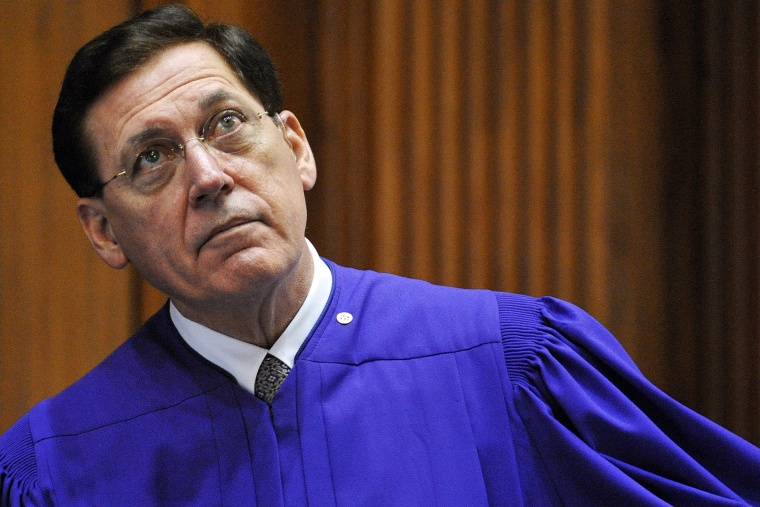When the College of Charleston selected South Carolina Lt. Gov. Glenn McConnell to be its next president, it did so under a haze of controversy and dissent from students and faculty alike.
And in newly released documents, it appears that the school’s board of trustees appointed the polarizing figure against the advice of the search committee it paid to find a new president, and against the protestations of board members who feared McConnell would be a divisive figure in the college community.
Members of the college’s presidential search committee even warned the board of the possibility of public fallout if the board went outside of the list of final candidates it recommended, according to The Post and Courier and minutes from a board of trustees meeting provided to msnbc by a student organization.
McConnell has long been an outsized and contentious figure in the state. As a member of the legislature, McConnell fought hard to keep the Confederate flag flying over the state capitol building. He’s been a Confederate sympathizer and an avid Civil War re-enactor. In more recent years, McConnell ignited a maelstrom after a photo of him dressed as a Confederate general and posing with a pair of African Americans in slave garb went viral.
His appointment earlier this month sparked widespread protests, as students, clergy and local civil rights organizations said McConnell’s appointment muddies the college's image and hurts efforts to diversify its student body.
During the search process, Sharon Kingman -- a member of the presidential search committee and chair of the College of Charleston Foundation, a non-profit fundraiser for the school -- and six other search committee members wrote a letter to the board of trustees saying that if “the politicization of this process occurs, the consequences will be far-reaching,” according to The Post and Courier. The letter reportedly went on to say that reputable search firms would no longer work with the college and that the erosion of trust would damage the school’s ability to recruit faculty and staff in the future.
But it also could cause “nearly every constituent group on campus” to lose confidence in the board of trustees, the letter said.
The letter was signed by a number of faculty leaders, including the speaker of the faculty Senate, an assistant athletic director, dean of the School of Education, Health and Human Performance and president of the Student Government Association (SGA).
The board hired McConnell in late March to the $300,000-a-year job, though he was reportedly not among the search committees list of finalists. A wide umbrella group of demonstrators held rallies and protests on campus demanding McConnell’s removal. Petitions were circulated. And the SGA and faculty Senate both gave the board a vote of no-confidence.
McConnell, who has never worked in higher education, beat out a handful of finalists with extensive experience working in colleges and universities, including University of West Florida Provost Martha Saunders and Dennis Encarnation, a consultant and fellow at Harvard University.
Before becoming lieutenant governor, McConnell spent about three decades as a state legislator, rising to the post of president of the state Senate. Opponents of his appointment as college president say the legislature essentially strong-armed the board of trustees into tapping McConnell for the position.
Kingman, the search committee member, told The Post and Courier that lawmakers pressured trustees to select McConnell despite the committee’s recommendations.
Brandon Upson, a recent graduate of the College of Charleston and a leader of the campus protests, said the latest revelations confirm what many students and faculty say they have known from the beginning.
“It reinforces what we understood at the very beginning but didn’t have the substantial evidence to prove publicly, that it was a flawed search process from begging to end,” Upson told msnbc. “And no matter what the quality of candidates that the search committee presented, the board of trustees already knew they had to let Glenn McConnell in by any means necessary, because at the end of the day they were working for the South Carolina legislature and not for the greater good of the institution as a whole.”
McConnell’s appointment comes during a new campaign aimed at diversifying its student body, which with just 6% minority students has one of the lowest student diversity rates in the state.
The bad public relations surrounding the McConnell appointment came on the heels of another highly charged incident in which the state legislature voted to cut more than $50,000 in funding after a gay-themed book was selected as freshman reading material.
The book, Fun Home, a graphic memoir in which the author describes her early life and struggle of coming out to her family, was also made into a Broadway play.
In May, as an act of protest, Broadway actors are set to perform the play at a venue not far from the college’s campus.
“We’re fighting for diversity. We’re fighting for the culture of the campus. And although the numbers for diversity of color are particularly low, the campus as a whole is a very open-minded and diverse in thinking institution,” Upson said. “And that’s what attracts people to it. And the work of the legislature to try to stifle that culture and control it is ticking people off.”
